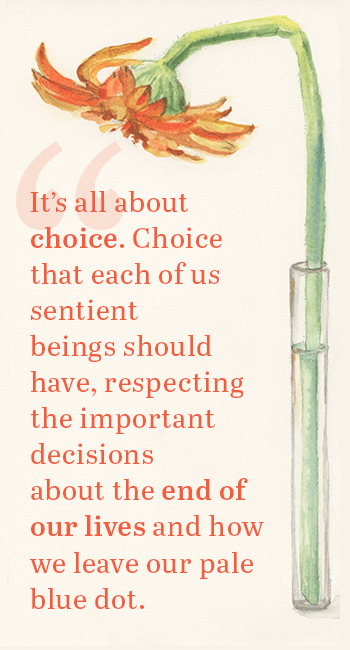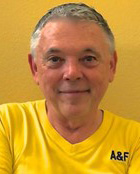End-of-Life Empowerment
Professional experience and personal loss make doctor an advocate, including penning a film
The one absolute certainty in human life is death. Death can come at any time for several reasons, including disease, trauma, or the ravages of aging.
During my career as a physician, I have worked with patients of all ages as they struggled with various medical conditions, acute and chronic, that ultimately led to their demise. I always had a passion for empathy and support for patients and their loved ones during these tragic times. In recent years, I have applied my passion to supporting the concept that patients with a life-limiting illness have their wishes respected with dignity and compassion about how they end their lives.
In medical school and residency, we were trained to remain objective and restrain our emotions under these circumstances to reassure the patient and family that we were making the right decisions and that we were in control. Over time, that dogma has changed for the better and is now much more aligned with the approach I adopted early on.
Our family is originally from Hungary. We escaped during the 1956 Hungarian Revolution when I was 7 years old, and we were accepted to Great Britain on the refugee quota. Nine years later, we moved to Saskatchewan, Canada, where my dad practiced as a family doctor and surgeon in a small town. I finished high school in Canada and college in Michigan then entered Loma Linda University School of Medicine at 18. After a straight pediatric internship, I took a break and practiced emergency medicine for about seven years but finally decided to finish my pediatric training at The Hospital for Sick Children, affectionately known as Sick Kids. I also completed a year of pediatric hematology oncology fellowship.

During my time at Sick Kids, there were many young patients whose experience helped me develop a supportive, empathetic approach that helped family members through the heartbreaking experience of the death of a child.
As a senior pediatric resident, I admitted a previously healthy 7-year-old girl with hemolytic uremic syndrome. Her kidneys shut down, and she rapidly developed serious brain damage. She deteriorated fast despite aggressive treatment and life support, and within 72 hours she was dead. Being present and supportive to the parents during this devastating experience was important for them, and for me. During my pediatric oncology fellowship, I helped quite a number of families deal with the issues as their little ones passed away with aggressive childhood cancers after all treatment options had failed.
After my training at Sick Kids, I returned to California to practice pediatrics and pediatric hematology and oncology in different settings, including as an assistant clinical professor at the University of California, Irvine Medical Center.
Ironically, it was during my early days back in California that I dealt with death in the most moving, challenging, and heartbreaking ways. At nine months of age, my happy, feisty little boy developed a mysterious, devastating medical condition and died within 48 hours. The profound emotional impact of this experience made me intimately realize what parents went through when a child died. In pediatric cancer, the survival rates among children have greatly increased over the decades due to the many new treatments available, but there are still those little ones who do not make it.
In my pediatric oncology practice, one unforgettable patient was a little girl diagnosed with leukemia who I treated for almost three years. We went through the standard treatments, and she did well for a while but then relapsed, which meant going to clinical trials. When all available treatments failed, I had to explain to the parents that she would die relatively soon. But I wanted to make sure they understood the options for the ensuing short weeks and days: either in the hospital with intravenous lines, monitors, and tubes, or they could take her home with some strong pain medicine, and I would come by and visit the family to make sure the little girl was as comfortable as possible under the circumstance. A couple of weeks later she died in her mother’s arms. The parents were so thankful that this is how their sweet daughter left the world rather than the alternative. I was pediatrician to the younger sibling who was healthy and growing with the energy and fearlessness so innate in these little angels.
Seeing how broken the American health care system was at so many levels … I wanted to make a difference to help improve whatever elements I could.
After 23 years as a practicing clinician, I made the move to become a physician executive in health plans and consulting companies. My motivation was driven by seeing how broken the American health care system was at so many levels, and I wanted to make a difference to help improve whatever elements I could.
During my time in Southern California as a physician working with two large national health plans, my father’s wife suddenly died of a massive brain hemorrhage. She was on life support and clearly would not recover. Based on her wishes and my father’s support, seven people benefited from organs she donated, and then life support was discontinued. My family and I supported my dad as he went through this painful experience.
When my dad was 80 years old, with a clear head at the time, he completed an advance directive and made me his health care proxy to ensure his wishes would be respected at the end of his life. Over the next few years, he developed ever-increasing, disabling dementia, and in the final few months, he developed kidney failure. He had made clear that under such circumstances he did not want life-sustaining interventions. So, when he was hospitalized with significant kidney failure and in a semiconscious state, his physician asked if we should put him on dialysis and get his bloodwork in order. I made sure that the physician saw my dad’s advance directive and told him to provide comfort measures only. Within a few days my father died with his end-of-life wishes respected and honored.
In 2014, aligned with my experiences as a clinician caring for seriously ill patients, I led a small, dedicated team at Cambia Health Solutions to establish the nation’s first health plan-based comprehensive palliative care program. Our work got quite a bit of attention on Capitol Hill, at the Centers for Medicare & Medicaid Services (CMS), and among other health plans across the country. Indeed, the movement has grown, and there have been significant changes at CMS in the Medicare Advantage space related to palliative care and hospice.
Most recently, I have also become a board member of Compassion & Choices, a national organization that supports living life on one’s own terms, improving care, expanding options, and empowering everyone to chart their end-of-life journey.
In December 2017, I had an epiphany, driven by the demise of a young friend who died of colon cancer in their late 30s a few months earlier.
Having studied screenwriting from fellow Mensan Terry Black and film production over the years, I poured out a script in 10 days about a character based on this friend’s story and then went into an intense drive to get it produced. I brought on my good friend, actor and theatrical director Tim True, as cowriter and director of the movie. Within three months we brought on our line producers and production crew. And in another couple of months the casting was complete, including three well-known actors, Anna Camp (True Blood and Pitch Perfect), Steven Strait (The Expanse), and Joe Lo Truglio (Brooklyn Nine-Nine). For the entire team this was a labor of love on a controversial but important issue. The movie, Here Awhile, was released June 9, 2020, in the U.S. and Oct. 8, 2020, internationally. It is available on major video platforms.
The movie’s title was inspired by a beautiful little poem by Mary Lee Hall, “Turn Again to Life,” often read at funerals:
If I should die, and leave you here awhile
Be not like others sore undone, who keep
Long vigils by the silent dust and weep.
For my sake, turn again to life, and smile,
Nerving thy heart and trembling hand to do
Something to comfort weaker hearts than thine.
Complete these dear unfinished tasks of mine,
And I, perchance, may therein comfort you!
It’s all about choice. Choice that each of us sentient beings should have, respecting the important decisions about the end of our lives and how we leave our pale blue dot.

